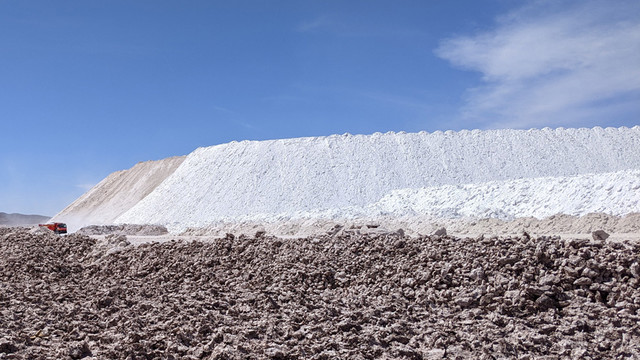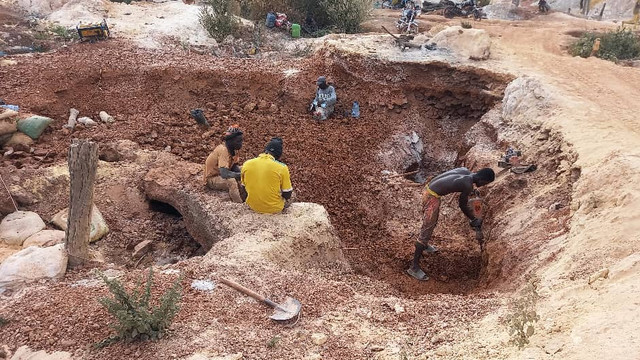Mining contract transparency improves local planning in Mali
In Mali, a civil society coalition worked with communities to achieve greater transparency on gold mining contracts and to hold authorities and companies to account. Their aim: to turn Mali’s mining sector into a lever for socio-econmic development and improve living conditions around mining sites.
Nouhoum Diakite charts a success story, with limitations…


Weighing gold (Photo: Enough Project, via Flickr, CC BY-NC-ND 2.0 Deed)
Since 2020, people living near the Syama gold mine in Mali have been involved in drawing up their commune's Social, Economic and Cultural Development Plan (PDSEC) and have monitored its implementation. Community development actions initiated by the mining company are drawn directly from the development plan, after consultation with the local administrative authorities and local community representatives.
This process is the result of work by the Malian civil society coalition Publiez Ce Que Vous Payez (Publish what you pay), which has campaigned for the publication of mining contracts and supported the community to monitor the legal and contractual obligations of mining companies and manage the revenues generated by mining and earmarked for local development.
The Syama mine example shows how improving investment governance can, if leveraged successfully, lead to better outcomes for communities affected by large investment projects such as mines, dams and industrial farming.
This blog is a contribution to the Advancing Land-based Investment Governance (ALIGN) project, which provides a space for practitioners to exchange insights into approaches they have taken.
Mali’s gold attracts international investors
The Syama mine is a large open-pit and underground gold mining and processing complex in south-eastern Mali. Syama is in the district of Fourou, an agricultural/pastoralist region. Eight villages surround the mine.
Artisanal miners have worked the area’s gold fields for centuries; international investors arrived in the late 1980s. Operations ceased at the mine between 2001 and 2019 when it was acquired by the Australian gold mining company Resolute Mining.
The mine is operated via the subsidiary Société des Mines de Syama S.A. (SOMISY), in which Resolute has an 80% interest, while the government of Mali holds the remaining 20%.
Civil society calls for mining contracts to be published
Since 2007, Mali has been implementing the Extractive Industries Transparency Initiative (EITI), a global standard that promotes transparency and accountability in the extractive sector.
Based on the relevant provisions of the 2013 (PDF) and 2016 EITI Standard (PDF), PWYP Mali (which sits on the EITI steering committee) has undertaken advocacy to ensure that all mining contracts in Mali are published.
In 2021, after PWYP Mali published a report denouncing the opacity surrounding mining contracts, the Mali EITI steering committee made publication of mining contracts mandatory.
Making use of contracts to claim rights
Citizens can only monitor mining companies' contractual obligations if the contracts are published and when they have the technical capacities to understand and analyse them. PWYP Mali organised capacity-building sessions on reading and analysing mining contracts, based on the 12 mining contracts (in French) already published on the website of the Malian Ministry of Mines, Energy and Water (in French), for communities living near mining sites.
In Farou, these activities began in 2017 with the setting up of a working group on mining issues (inclusive of women, young people, men, grassroots community organisations and traditional authorities).
The working group was equipped with technical capacities to enable them to read and understand the March 2019 establishment agreement (PDF in French) between the government of Mali and SOMISY for the exploitation of the Syama gold deposits. The programme also supported the community's active participation in decision-making bodies at the commune level.
Creating the conditions for free and informed dialogue between stakeholders at local level
Without the commitment of the local authorities and the mining company, it would have been difficult for the communities to participate fully in decision-making bodies at the communal level and to engage in productive dialogue with the mining company for the benefit of all the people of the Fourou locality.
PWYP Mali initiated a dialogue with the head of community development at the Syama mine and with local elected representatives.
With the mining company, the aim was to explain the merits of ongoing dialogue with local communities, to encourage the mining company to apply the provisions of the 2012 mining code relating to participation in local development, and to encourage the mining company to align its local development plan with that of the municipality so as to respond effectively to the needs already identified by the community.
As for local elected representatives, PWYP wanted to encourage them to involve local communities more closely in drawing up local development plans.
Positive spin-offs from citizen monitoring of mining operations
Project activities included:
- Training communities in contract analysis and monitoring of mining companies’ legal and contractual obligations
- Establishing a multi-stakeholder consultation framework, and
- Promoting community participation in the development of the Social, Economic and Cultural Development Plan.
The positive spin-offs were not long in coming. The priority community projects included in the PDSECs are now financed by the mining company. This has the advantage of ensuring that projects of major interest to local communities are implemented on time. The town of Fourou has been provided with classrooms, a borehole and bridges to improve transport links.

The community health centre in Fourou built by the SOMISY (Photo: copyright Publiez Ce Que Vous Payez Mali)
Civil society must continue lobbying for contracts and appendices to be published
Despite the Malian government's decision to make publication of all mining contracts compulsory, to date a number of mining contracts have not been made available to the public. The same applies to the annexes to mining contracts.
These include environmental and social impact assessment reports, agreements for the construction of mine-related infrastructure, and contract amendments. These appendices are of vital importance, as their implementation could have a significant impact on local communities.
Public decision-makers and investors present the mining sector in Mali to communities as an opportunity for growth and development. However, past experience has shown that the opening of a mine does not always produce growth and development at the local level. What's more, beyond the hype, communities are often unaware of the legal and contractual obligations of the mining companies operating in their vicinity.
Access to contracts and capacity building in the analysis of these contracts by civil society organisations would enable communities to participate in a free and informed way in the management of the mineral resources that abound in their subsoil, as well as in the management of revenues from the exploitation of mineral resources.
With thanks to Eric Bisil for his contributions to this insight.




